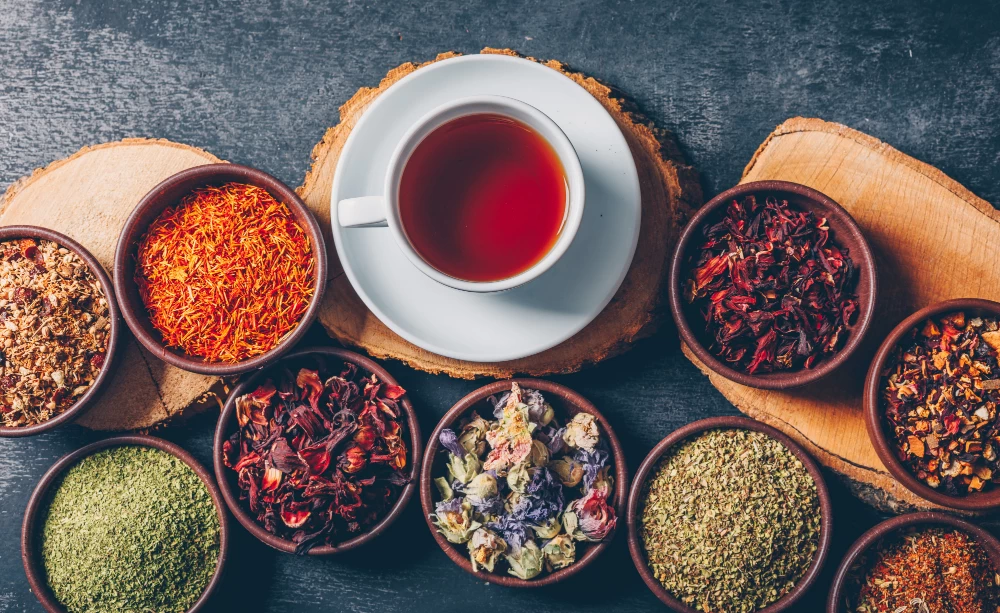
Health from Nature: Herbal Teas
- Health from Nature: Herbal Teas
- The Place of Herbal Teas in Our Lives:
- Preparation of Herbal Teas:
- Herbal Teas and Health
- Contribution of Herbal Teas to Breast Milk
The Place of Herbal Teas in Our Lives:
Plants have been used for different purposes in many periods of history and have survived until today. It has been used frequently in the fields of food, medicine and cosmetics. Through trial and error, it has been learned which plant will be used for which purpose throughout history, and the poisonous and curative (medical) ones have been distinguished.
In recent years, functional foods have been on the rise. Nutraceutical beverages are also included in functional foods. Nutraceutical drinks, in short, can be defined as drinks with medicinal and healing effects. In this case, herbal teas are also among the nutraceutical drinks. Herbal teas are of great importance in the daily diet, especially in terms of strengthening the immune system. The health effects of these teas are associated with the antioxidant properties of vitamins A, C and E and phenolic compounds in their content. It is reported that thanks to the antioxidant content in the composition of herbal teas, it can help reduce the risk of developing acute and chronic diseases. According to a study on the antioxidant levels of herbal teas; The highest antioxidant level was observed in lemon balm and green tea. In other teas, from large to small; linden, sage, white tea, echinacea, black tea, chamomile and ginger.
Tea is a popular beverage that can find its place at every meal, especially on Anatolian tables. He is usually the main guest in long conversations, meetings with family or friends. There are many types of tea that is frequently preferred. It is commonly referred to as herbal teas and has many benefits. Herbal teas, which are consumed sometimes to calm down, sometimes to increase our immunity and more, are gaining more and more importance day by day.
Preparation of Herbal Teas:
While preparing herbal teas, fresh or dried fruits, leaves, flowers, roots, stems and sometimes seeds can be used. Herbal teas can be obtained by using different brewing methods. These methods are briefly as follows;
- The infusion method can be prepared by pouring boiling water over the herbal ingredients and letting it brew for 5-15 minutes.
- The decoction method can be done by pouring cold water on the herbal materials and letting them boil for 15-30 minutes.
- In the maceration method, herbal substances can be made ready for use by keeping them at room temperature for 30 minutes.
The fact that there are many types of preparation of herbal teas is related to the fact that it varies depending on traditions and medicinal purposes.
Herbal Teas and Health
Herbal teas have various effects on health. Strengthening immunity, facilitating digestion, and relieving psychologically are among its positive effects. Plant varieties can serve different purposes. In addition to its good taste and aroma, there is an increase in its consumption due to its healing effects. Today, the number of plants used for this purpose is quite high. In this sense, teas obtained from the following plants are mostly consumed in our country:
- Sage
- Raspberry
- Anise
- Rosemary
- Mountain tea
- Echinacea
- Apple
- Basil
- Linden
- Nettle
- Oregano
- Rosehip
- Melissa
- Mint
- Daisy
- Fennel
- Senna
- Tarragon
Herbal teas are known to have positive effects on health. If we list these effects;
- Antiaging effect: (Aging effects removal feature)
- Antiatherogenic effect: (Cleansing the blood vessels)
- Anti-inflammatory effect: (Inflammation removal feature)
- Anticarcinogenic Effect: (The ability to prevent cancer formation and kill cancerous cells)
- Antimicrobial Effect: (Inhibit the development of harmful microorganisms)
- Antioxidant Effect: (Cleaning free oxygen radicals and protecting cells)
- Heart Protective Effect
In the studies conducted, it was determined that the antioxidant effects of herbal teas were high and it was determined that this was due to the high phenolic substances in the plants.
Herbal teas with such functional properties can be used to solve the following problems;
- Psychosomatic diseases
- Common cold
- Gastrointestinal diseases
- Urinary system diseases
- Diarrhea
- Constipation
- Menstrual complaints
- Physical and mental fatigue states
- Taste and odor corrector (local use as mouthwash)
Medicinal Plants Used in the Treatment of Some Diseases:
- Kidney diseases: Goldwort (immortal flower), horsetail, couch grass
- Indigestion: Anise, dill, galangal, cardamom, cumin, chamomile, fennel, allspice, ginger
- Nausea and pains: Spinach root, peppermint, ginger.
- Colds, chills and cough: Juniper, mallow, echinacea, linden, clove, licorice root, mint, eucalyptus, chamomile, ginger.
- Stress, depression and anxiety: Anise, St. John's Wort, lavender, lemon balm, chamomile, fennel, hops
- Forgetfulness and poor memory: Sage, rosemary, cardamom, green tea, ginger
- Sleep disturbance: Anise, evening primrose, valerian, lemon balm, chamomile, fennel, hops
- Fatigue: Sage, rosemary, licorice, cardamom, thyme, rosehip, ginger
- High Cholesterol: Rosemary, thyme, rosehip, grape seed, green tea, ginger
- High sugar: bitter melon, mahaleb, cinnamon, myrtle
- Slimming Tea: Rosemary, cherry stalk, corn silk, fennel, cassia, ginger, turmeric, green tea
Contribution of Herbal Teas to Breast Milk
Breast milk is the most basic nutrient that meets all the nutrients required for the normal development of a full-term baby and is sufficient alone for the first 6 months. Mothers who think that their milk is not enough and want to breastfeed their babies resort to various methods to increase their milk, traditionally give importance to the consumption of certain foods and commonly use herbal teas. Usually mothers; They stated that herbal teas such as fennel, linden, anise, galactagogue herbal mixture tea, quince leaf increase milk. Medicinal plants that increase milk; herbs such as fenugreek, goat's mother-of-pearl, bull thistle, anise, basil, fennel seeds, and sweets such as marshmallows. Malted beverages are widely used in some countries. Alcohol can reduce breast milk production, while malted beverages are stated to be effective galactogogues, but there is no evidence to support this. Although many studies have been conducted on breast milk enhancing teas to increase the amount of breast milk, it has been reported that studies on the effect of teas on breast milk content are quite insufficient.





